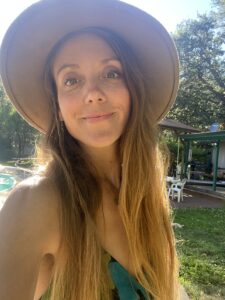Sierra Warren is a fourth-year student at Pacifica in the Clinical Psychology Program, who was one of four students who was awarded a scholarship through Pacifica Extension and Student Services to attend Pacifica’s “Individuation and Psychedelics Conversations with Jungian Analysts” conference, which was held Dec 15-17, 2023. I’m delighted to speak with Sierra about her experience at the conference and also her academic work.
Angela: Tell me a little about your background and what attracted you to Pacifica.
 Sierra: Prior to coming to Pacifica, I was a third- and fourth-grade teacher at a Waldorf school, with a low-income population. There was a significant amount of trauma there, and I recognized a lot of the work I was doing with my students was helping to navigate that trauma to support learning. Through this experience, I realized I was drawn to working with children in more psychological means, by tending to the development of soul. So I started to look into different options. Through a synchronistic process, I discovered Pacifica. When I read about Pacifica’s clinical program, I actually started crying, because it was so resonant with what I knew in my soul I am supposed to be doing. I didn’t go in search of it, I was led to this path.
Sierra: Prior to coming to Pacifica, I was a third- and fourth-grade teacher at a Waldorf school, with a low-income population. There was a significant amount of trauma there, and I recognized a lot of the work I was doing with my students was helping to navigate that trauma to support learning. Through this experience, I realized I was drawn to working with children in more psychological means, by tending to the development of soul. So I started to look into different options. Through a synchronistic process, I discovered Pacifica. When I read about Pacifica’s clinical program, I actually started crying, because it was so resonant with what I knew in my soul I am supposed to be doing. I didn’t go in search of it, I was led to this path.
Angela: That’s beautiful. What a wonderful feeling! Also, congratulations on your scholarship to the “Individuation and Psychedelics Conversations with Jungian Analysts” conference. What drew you to the conference? Is it part of your academic interests?
Sierra: Prior to moving to San Diego, which I did for my doctoral internships, I was living in Oregon, and about two years ago there was a measure passed legalizing psilocybin, exploring it as a medicine. I had some personal and professional experience with it, so was somewhat involved with Measure 209, which helped it become more accessible in the state of Oregon. The way the law was written, it’s not for the treatment of mental health; anyone can participate as long as they’re at a licensed center with a facilitator. It’s trying to make psilocybin more accessible to broader populations. Luckily it passed, but it’s been a complicated process. That started about the same time that I started in Clinical at Pacifica. So I’ve been tracking the psilocybin movement in or alongside my own work as a clinical psychologist. I’m in favor of accessibility and equity in the amount of access people have to these experiences. I’m also looking at them through the lens of preserving traditions and recognizing indigenous traditions within that and asking what the role of the psychologist is within this.
My areas of interest have been culminated in my dissertation, which looks at psilocybin as a treatment for chronic pain through the lens of depth psychology.
Angela: What were you expecting from the conference and did it bring you the experience you hoped?
Sierra: I was really excited when I saw Pacifica was offering scholarships. I was looking to connect with other students, professors, and practitioners in this field that is undergoing a renaissance, with psychedelics emerging back into the cultural milieu. It was so wonderful to look at that through the Jungian lens, which I‘m not as familiar with but I’m captivated by. The pairing of the conference with Jungian analysis, while considering the broader topic of psychedelics through the psychoanalytic perspective was really amazing. I was especially interested in how individuation becomes possible through analysis using psychedelics as an aid. Everyone I interacted was open and warm, and it was a really positive feeling from the conference. It was really lovely that Dr. Corbett and Dr. Leslie did such a great job of picking presenters who covered so many elements of this topic, which was really rich. A highlight was discussing with my dissertation Chair how I might weave some of the topics from the conference into my dissertation. It really allowed me to expand my perception of Jungian analysis and psychedelics. It was transformational as a student and researcher to steep in the essence that was available through all the different presentations.
Angela: Were there any speakers or parts of the conference that really impacted you?
Sierra: There seemed to be so much aliveness and energy in some of the female presenters in their material. I was inspired by that, being a woman myself. I think some of that had to do with a few presenters who did a beautiful job of connecting their personal work with clients as facilitators or analysts or whatever role they were playing. They highlighted those experiences in a way that made what they were saying come alive. I also loved that there was a significant amount of attention paid to the indigenous and more traditional uses of psychedelics and plant medicines and how Jungian analysis can hold that and why that’s important. And I was impressed by the diversity of the presenters and the contents of their talks.
Angela: How did your thoughts of psychedelics and depth psychology change or deepen as a result of the conference?
Sierra: That’s a big question and one I’m still thinking about. There is an element that happens in depth-oriented work, where there is the collective and the individual consciousness and then something that is not quite either that continues to work on you. I was reminded of Robert Romanyshyn’s The Wounded Researcher, and the question of why we’re called to research what we do. It very much felt like the conference was part of my own unfolding of why I’m doing this research, why I’m being called to it, and how I can consider it in a way that is as deeply conscious as possible. It honestly confirmed how important depth psychology is to psychedelics because of all the levels that depth psychology goes to in consideration of how these experiences impact our psyche and souls. My hope is to incorporate more Jungian-based questions related to dreams, visions, symbols, and archetypes in the questions I ask and to see if there is any kind of somatic responses or images that emerge for people with chronic pain. That’s a tangible element of Jungian analysis I’m hoping to incorporate in my research.
Angela: I’m so glad you benefited from it. Certainly the uniqueness of the topic is not something many graduate schools would tackle. In that respect, Pacifica is a special place. What do you most enjoy about studying here?
Sierra: It’s all the things that matter in terms of intentionality and consciousness, starting with the aesthetics and the focus on beauty on both of the campuses. The grounds are stunning and being surrounded by nature as much as possible contributes to that feeling. The way that classes are held and the approaches of the majority of professors at Pacifica have been a contributing factor for me in what I’ve gleaned from the experience. I’ve appreciated having a cohort; the relationships I’ve built there have been lifelong and very supportive of becoming a psychologist and the next version of myself. So I’d say that the earth and people are the highlights. Obviously the content too. I knew right off the bat Pacifica was the one. The content of the courses in the Clinical Program are hard to find at other institutions, at least to the same depth and degree Pacifica goes into it. So I’m glad I chose Pacifica for a depth psychological education.
Angela: Thank you so much for speaking with me and best of luck in your studies!
Pacifica Extension and International Studies has a roster of programs that anyone is eligible to sign up for. Coming up is “Writing Down the Soul: An Archetypal and Mythological Approach to Memoir Writing” March 23, 2024 – December 8th, 2024. Visit here.

Sierra Dawn Warren, MA, has completed coursework for her doctorate in Clinical Psychology from Pacifica Graduate Institute in Santa Barbara and is currently working to fulfill her pre-doctoral internship hours while researching and writing her dissertation. Sierra works as a trauma-informed registered marriage and family associate in Oregon supporting youth and families, and as a Psychological Associate in California working with adults. She specializes in post-traumatic stress disorder, dissociation, eating disorders, and supporting neurodivergent individuals and those in the LGBTQIA+ community. Sierra is focusing her dissertation research on psilocybin as a treatment for chronic pain conditions, specifically fibromyalgia, while working as a monitor on a research study at UCSD exploring psilocybin as a treatment for phantom limb pain. Sierra is currently offering combination Ketamine-Assisted Psychotherapy and EMDR for patients through Silvi Integrative Health remotely in the state of California.

Angela Borda is a writer for Pacifica Graduate Institute, as well as the editor of the Santa Barbara Literary Journal. Her work has been published in Food & Home, Peregrine, Hurricanes & Swan Songs, Delirium Corridor, Still Arts Quarterly, Danse Macabre, and is forthcoming in The Tertiary Lodger and Running Wild Anthology of Stories, Vol. 5.


